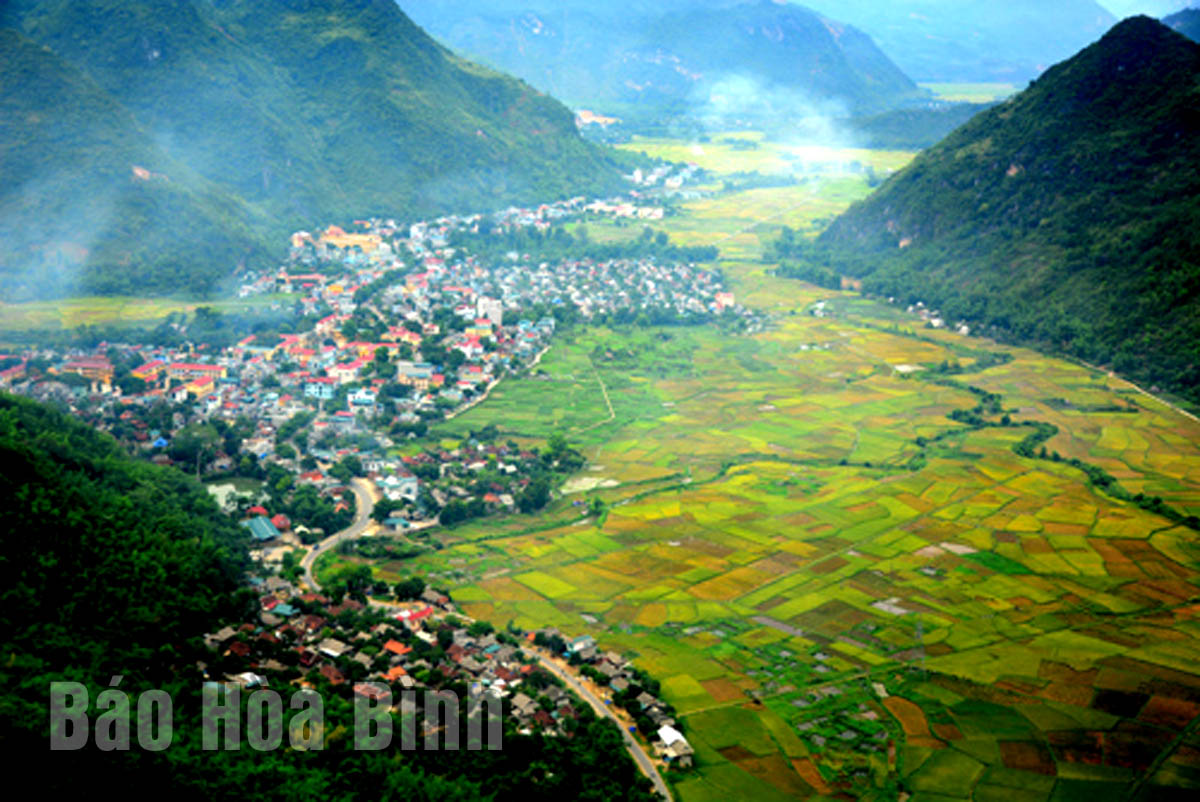
(HBO) - The Standing Board of the provincial Party Committee has just issued Resolution No. 20-NQ/TU orienting the development of Mai Chau township into a four-tier urban area to 2030.
Mai Chau township in the district of the same name will become a four-tier urban area by 2030.
The target will be realised on the basis of promoting existing potentials and strengths. The locality will preserve and promote cultural values while restructuring the economy towards increasing the proportion of trade - services and industry – construction. Agriculture will be developed in the direction of biotechnology, high quality and added value so as to turn Mai Chau township into a centre of tourism and service development of the province.
To achieve sustainable economic development, Mai Chau township will invest in building modern and synchronous infrastructure; reasonable labour structure, diversifying jobs, contributing to improving the people's material and spiritual life as well as ensuring national defence – security. The locality will build a strong political system, a contingent of cadres and civil servants with firm political spirit, professional skills and management capacity which meet the requirements of tasks in the new situation.
Implementing the resolution, from 2023 - 2025, the province will assist Mai Chau district in completing a project on adjustment and expansion of the general planning with a scale of 1/5000 for Mai Chau township by 2030, with a vision to 2040. The locality will effectively exploit available strengths, focusing on meeting criteria and standards of a four-tier urban area, especially building and upgrading the technical infrastructure network. From 2026 – 2030, attention will be paid to expanding the urban area to the north, south and southwest; developing new urban areas as well as completing technical and social infrastructure. It strives to be recognised as a four-tier urban area by 2030.
The total investment capital to realise the target is about 1.1 trillion VND (46.2 million USD). This sum of capital mainly comes from the provincial budget and mobilises from non-state budget sources.
The Standing Board of the Hoa Binh provincial Party Committee has agreed in principle on a proposal by the Standing Board of the Party Committee of Hoa Binh city to gather feedback on the city’s 1:2000 zoning plan, which forms part of its broader urban development strategy.
Hoa Binh province has made notable progress in public administration reform and digital government development, with the satisfaction index among citizens and businesses reaching over 84%, according to recent government evaluations.
Thanks to great efforts by local authorities in recent times, the governance and public administration performance of Mai Chau district has been significantly improved.
In the afternoon of June 6, the Party Committee, the People's Council, the People's Committee and the Fatherland Front of Lac Son district solemnly held a meeting to celebrate the 139th anniversary of the district's founding (1886–2025) and the 79th anniversary of the establishment of the district's Party Committee (1946–2025). There was the attendance of Mr. Bui Van Thang, the Vice Chairman of the Provincial People's Council; Mr. Quach Tat Liem, the Vice Chairman of the Provincial People's Committee; Ms. Dang Bich Ngoc, the Deputy Head of the National Assembly Delegation of the province; as well as the former leaders of the province and district through various periods, who are the natives of the district.
Implementing the Politburo’s Resolution No. 57-NQ/TW on breakthroughs in science – technology, innovation, and digital transformation is a golden opportunity for the northern mountainous province of Hoa Binh to renew growth model, improve competitive edge and shorten digital gap.
Resolution 57-NQ/TW, issued by the Politburo on December 22, 2024, identifies sci-tech, innovation, and digital transformation as strategic breakthroughs to build a developed and prosperous nation. In Hoa Binh province, this spirit is not just a slogan, it’s being put into action through concrete initiatives that form a "new development triangle”: digital citizenship, digital economy, and digital administration.



